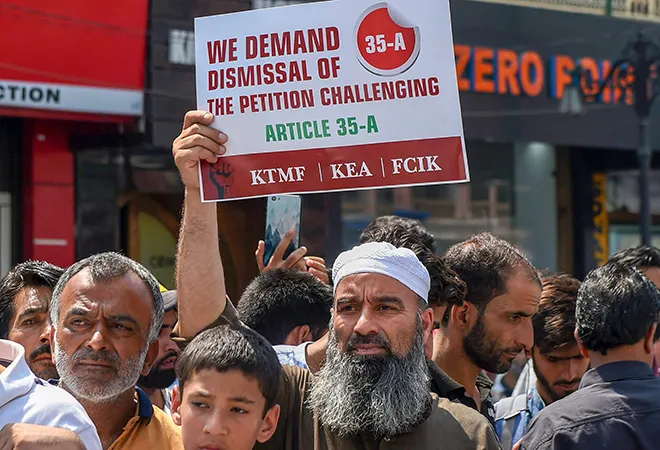
The political agitation on the Supreme Court hearing on Article 35A of the Indian Constitution has manifested a queer political mingling in Jammu and Kashmir. Separatist groups, fighting to secede from India, have found a common cause with the mainstream parties, which accept and uphold the accession of the state of Jammu and Kashmir to India.
What is more remarkable is that the diametrically opposed political groupings have come together to defend an article of the Indian Constitution, which grants special status to the residents of the state. The rarity of this occasion is unmatched in the recent history of Jammu and Kashmir. Never before have secessionists come together with mainstream parties to defend the Indian Constitution. This rare political mingling is a manifestation of insecurity felt by a large section of the population, which sees attempts to denude the special status of Jammu and Kashmir to change the demographics of the state.
Hundreds of trade bodies and civil society groups joined hands, cutting across ideological divides, against any attempt to repeal the Article. The general strike on the 5 and 6 August got an unprecedented response. As per media reports, a complete shutdown was observed in the Kashmir valley, including some areas of the Jammu region and the tourist destination of Gulmarg, which has ignored strike calls during the agitations of 2008, 2010 and 2016. “I have never witnessed such a strong response to anything related to the Constitution of India in Kashmir in the last 29 years” Mubeen Shah, of the Kashmir Chamber of Commerce and Industry told Firstpost.
On 27 August, a rumour sparked protest and shut down across the Kashmir valley. The instant reaction to the rumour gives a sense of the prevailing sentiment and collective paranoia regarding the court hearings. A few days before the 6 August Supreme Court hearing, Kashmir was abuzz with rumours that the article would be revoked on the same day. An ordinary Kashmiri genuinely believed the article would cease to exist the next morning and hordes of non-Kashmiris would travel to the state to buy land and properties.
On the ground in Kashmir, there is a perception among common Kashmiris that the article will be revoked in a single court hearing and thus the people have to defend it. This perception belies a complete lack of understanding of the functioning of the courts in India and the fact the legal proceedings are a long drawn and time-consuming process. On my recent visit to Srinagar, I saw stickers in defence of the article posted on the buses, auto rickshaws and shops. In fact, even wedding invitation cards are also seeking unity of people in support of the article 35A.
The mainstream parties have in unison come in defence of the article and treated it as an existential matter. Having supported the accession of the state to the Union of India, it is imperative for them to defend the special status, which they see as a bridge between J&K and rest of India. On the flipside, the special status of the state has been watered down to a nominal position. Successive governments led by mainstream parties have been active and passive accomplices in diluting the special status.
Raising the tempo on the article 35A could serve big electoral dividends to the Bharatiya Janta Party. For the BJP, the road to 2019 may become easier if they manage to revoke the article, or at least give a sense of having made a serious attempt to “fully integrate” Kashmir. However, the electoral calculation should take national interest into consideration. The political parties must realise that peace and veneer of normalcy in the state is often tenuous and a mere spark can trigger another unrest similar to 2008, 2010 and 2016. The bogey created to revoke it may reap electoral dividends but in the long run, national interest will be harmed, as it is evident that a fresh spate of agitations is in the offing.
Kashmir valley is witnessing a renewed insurgency, which is only growing as each day passes. Efforts are underway have been made to calm the tempers since the unrest of 2016 to avoid another mass agitation. Revocation of the article will provide another reason for the people to be up in the arms against the state. At a time when the focus should be on containing the insurgency and restoring peace in the state, the politics around 35A will only create more fissures, which will most certainly be exploited by the enemy across the border.
The views expressed above belong to the author(s). ORF research and analyses now available on Telegram! Click here to access our curated content — blogs, longforms and interviews.




 PREV
PREV


